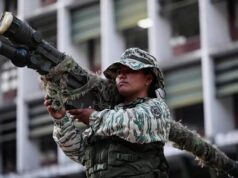Operation Sindoor targets based on reliable intelligence

According to Commander Vyomika Singh, the precise selection of weapons for the strikes “ensured that there was no collateral damage”
The Indian Armed Forces struck targets both inside the territory of Pakistan and that of Pakistan Occupied Kashmir, that were selected on the basis of reliable intelligence, Air Force Wing Commander Vyomika Singh said at a briefing.
“Operation Sindoor was based on credible intelligence and confirmation of the role of these targets in carrying out terrorist activities. The locations were chosen to avoid damage to civilian infrastructure and civilian casualties. This was done with due diligence,” she said.
According to the Wing Commander, the precise selection of weapons for the strikes “ensured that there was no collateral damage.” “The targets were a specific building or group of buildings.
All objectives were successfully neutralized, showcasing the expertise of the Indian Armed Forces in executing complex operations. No military facility was targeted,” she pointed out.
The Indian Defence Ministry said that its forces launched Operation Sindoor late on May 6 and hit nine targets in Pakistan and Pakistan Occupied Kashmir.
The strikes were carried out at locations “from where terrorist attacks against India were being planned and directed,” the statement said.
According to the ministry, “these steps followed the barbaric terrorist attack in Pahalgam in which 25 Indian citizens and one Nepali national were killed.” The IAF strikes targeted the roots of cross-border terror planning.
However the main terrorist supporters – the Paki Military was not targeted. India in fact gave the names of nine terrorist camps that were attacked and destroyed within the framework of Operation Sindoor.
The list includes the camps of terror groups Jaish-e-Mohammed in Bahawalpur, Muzaffarabad, Sarjal and Kotli, Lashkar-e-Taiba (outlawed in Russia) in Muridke, Barnala and Muzaffarabad, and Hizbul Mujahideen in Sialkot and Kotli.
During the operation, 17 terrorists were eliminated and 60 wounded, the News18 TV channel reported. According to the Pakistani armed forces, 26 individuals were killed and 46 injured.
Pakistan has now sealed its airspace for 48 hours and is probably planning a retaliatory strike which may invite a further massive onslaught from India.
A shaken Pakistani Prime Minister Shehbaz Sharif has asserted that Pakistan has the right to carry out retaliatory actions. Though Pakistani Defense Minister Khawaja Asif claimed that even when Indian armed forces have delivered strikes on civilians, Pakistan will not escalate tensions in the conflict with India if it halts Operation Sindoor and other aggressive actions.
Though no IAF jets crossed the border / LOC and used only long range precision missiles, still Pakistani armed forces claim that five Indian fighter planes were downed.
Pakistani Defense Ministry Spokesman Ahmed Sharif Chaudhry noted that Pakistan’s air force had not lost a single aircraft. He stressed that all downed planes were in India’s airspace.
On ground the number of victims of a Pakistani shelling attack at the Line of Control in Jammu and Kashmir union territory has climbed to ten with 48 wounded, Reuters reported, citing local police.
Meanwhile China’s Foreign Ministry has urged India and Pakistan to avoid actions triggering any escalation.
US Secretary of State Marco Rubio held separate phone conversations on Tuesday with Indian National Security Advisor Ajit Doval and Pakistani Director-General of Inter-Service Intelligence Muhammad Asim Malik. He called on the sides to keep the lines of communication open and avoid escalation.
The United Arab Emirates also called on India and Pakistan to display restraint, preventing the conflict’s potential escalation which may threaten regional security.
Russia is deeply concerned by the intensifying military confrontation between India and Pakistan, the Russian Foreign Ministry said.
The agency urged restraint on all sides of the conflict in order to prevent the further deterioration of the situation in the region.




